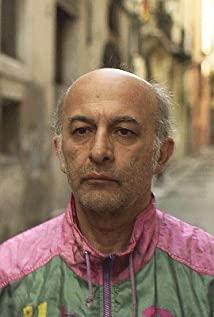Yes, "Fourteen Stations of the Cross" has a similar theme to those two excellent films, and it shows the same excellent light, and it is even more restrained and restrained in comparison. Therefore, the feeling of being so suffocated that there is nowhere to tell and wanting to vent will become stronger.
Mary, a middle school student, is a devout Catholic. Since she fell into it, she has consciously avoided the "temptations" of secular life. Pop music, the closeness of boys, dressing up, taking pictures, everything that was perfectly normal, the everyday pleasures that belonged to a young girl was regarded by her as unclean. She just wanted to "sacrifice to God". In fact, this renunciation of worldly pleasures is not without inner struggle. As an adolescent girl, she couldn't restrain her natural love for dressing up, and she also had to face the date invitation from the boy she loved, but she suppressed all of this through "confession" time and time again. She didn't understand why she was so devout yet still bothered by the devil, and she didn't know if she was a sinner.
"Fourteen Stations of the Cross" never took this theme as a curiosity for weird and marginalized people, but implanted this little girl into a most ordinary realistic background. In today's diverse and open society in Germany, girls like Maria are destined to be "wonderful", but the film's perspective is not discriminatory or even overlooked. Every tangle this girl got into.
Leaving aside the old-fashioned topic of religion's imprisoning of human nature, "Fourteen Stations of the Crucible" actually shows a lot of dilemmas at the secular level. From the analysis of secular reasons, Maria fell into some extreme emotions because of her younger brother. The little boy has been unable to learn to speak when he is the age to speak, and he has sought medical treatment without success. The priest's occasional phrase "perhaps God's will" seemed to give her some kind of epiphany, and Mary decided to dedicate herself to her brother's recovery. In fact, this is a kind of resistance to the desperate situation in reality, but it makes him fall into the abyss of some kind of mental illness.
On another level, Maria's family seems to be in harmony, but it is in crisis. The mother had typical bipolar tendencies. She was plagued by the illness of her little son who could not speak, and became paranoid because she was a devout believer. She could not be a competent, worldly mother, only between high-pitched reprimands and ineffective comforts. swing. And the role of the father is more interesting. In the whole movie, the father only has three or four lines, and it is still "it will be better in a while." This kind of invalid words. In a way, the father is absent. An anxious, strong mother and a silent and weak father are considered in many psychological studies that such a family of origin is the most typical breeding ground for children's psychological disorders.
So, from this point of view, the film not only points the lens of persecution at the church, and not only makes people think about how extreme beliefs can become an authority that imprisons themselves, but also points to the environment around us. If it wasn't for the negligence of her parents, Maria wouldn't have died in the end. This girl took off her coat in winter, deliberately made herself sick, didn't eat properly, refused gym class, and was laughed at by her peers, all of which her parents never noticed.
In contrast to this extreme and irresponsible role, the director has arranged several "normal" roles, the international student who works as a nanny at Maria's house, the boy in the next class who wants to make friends with Maria, and the hospital worker. Doctors, but in the end, these normal external worldly forces lose out to the mutated forces that come from within—within the family and within the spirit. Those gray matter trapped a young man.
Maria died of chronic flu and malnutrition, which seems a great irony in Europe today. What it mocks is actually indifference. The moment when the mother went from madness to crying while choosing the coffin was so shattering.
From the perspective of the film itself, "The Fourteenth Station of the Crucible" is also very ambitious. Many cameras are aimed at a person or group of people without moving, and you can scan your eyes from faces to analyze their subtle expressions like a bystander in the scene. Accompanied by this deliberately dull shot, a preaching voice is always telling the side. Except for the first scene, where the priest appears in the camera, most of the time, the words from "high places" have only voice and no image. This adds to the mystery. It's a wonderful metaphor, because each of us can get caught up in some kind of stubborn and extreme emotion, taking what we think is the right path, only to fall off a cliff.
(Text / Yang Shiyang)
View more about Stations of the Cross reviews










